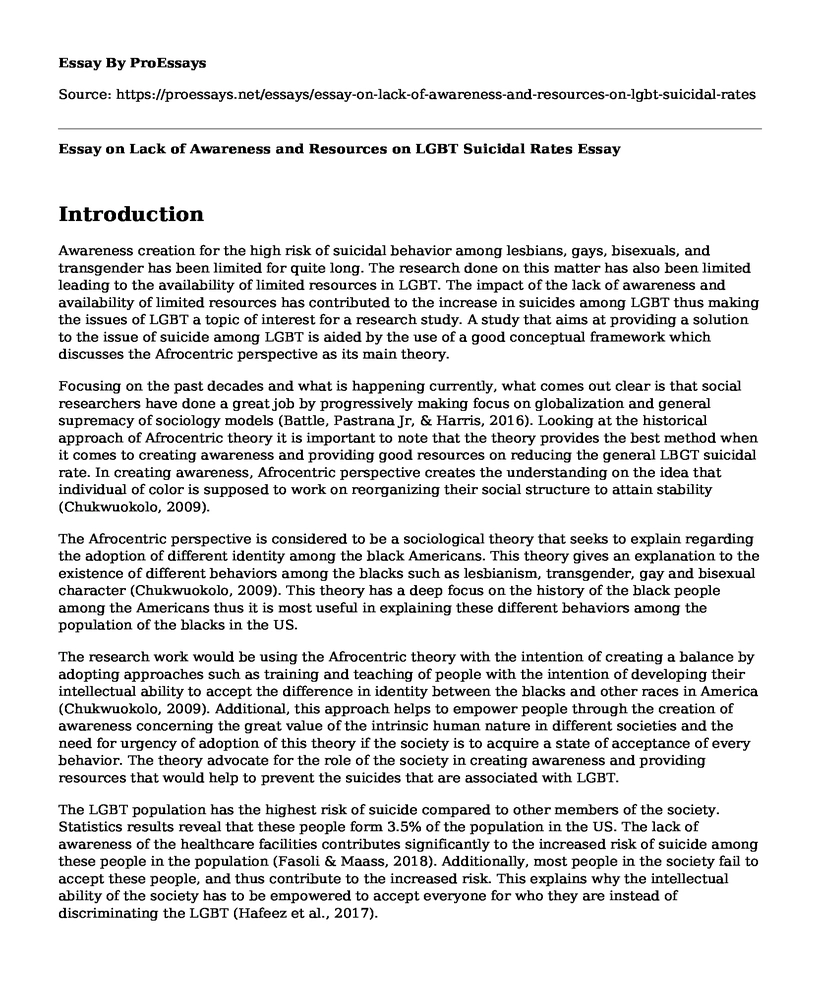Introduction
Awareness creation for the high risk of suicidal behavior among lesbians, gays, bisexuals, and transgender has been limited for quite long. The research done on this matter has also been limited leading to the availability of limited resources in LGBT. The impact of the lack of awareness and availability of limited resources has contributed to the increase in suicides among LGBT thus making the issues of LGBT a topic of interest for a research study. A study that aims at providing a solution to the issue of suicide among LGBT is aided by the use of a good conceptual framework which discusses the Afrocentric perspective as its main theory.
Focusing on the past decades and what is happening currently, what comes out clear is that social researchers have done a great job by progressively making focus on globalization and general supremacy of sociology models (Battle, Pastrana Jr, & Harris, 2016). Looking at the historical approach of Afrocentric theory it is important to note that the theory provides the best method when it comes to creating awareness and providing good resources on reducing the general LBGT suicidal rate. In creating awareness, Afrocentric perspective creates the understanding on the idea that individual of color is supposed to work on reorganizing their social structure to attain stability (Chukwuokolo, 2009).
The Afrocentric perspective is considered to be a sociological theory that seeks to explain regarding the adoption of different identity among the black Americans. This theory gives an explanation to the existence of different behaviors among the blacks such as lesbianism, transgender, gay and bisexual character (Chukwuokolo, 2009). This theory has a deep focus on the history of the black people among the Americans thus it is most useful in explaining these different behaviors among the population of the blacks in the US.
The research work would be using the Afrocentric theory with the intention of creating a balance by adopting approaches such as training and teaching of people with the intention of developing their intellectual ability to accept the difference in identity between the blacks and other races in America (Chukwuokolo, 2009). Additional, this approach helps to empower people through the creation of awareness concerning the great value of the intrinsic human nature in different societies and the need for urgency of adoption of this theory if the society is to acquire a state of acceptance of every behavior. The theory advocate for the role of the society in creating awareness and providing resources that would help to prevent the suicides that are associated with LGBT.
The LGBT population has the highest risk of suicide compared to other members of the society. Statistics results reveal that these people form 3.5% of the population in the US. The lack of awareness of the healthcare facilities contributes significantly to the increased risk of suicide among these people in the population (Fasoli & Maass, 2018). Additionally, most people in the society fail to accept these people, and thus contribute to the increased risk. This explains why the intellectual ability of the society has to be empowered to accept everyone for who they are instead of discriminating the LGBT (Hafeez et al., 2017).
Conclusion
Conclusively, Afrocentric approach as a sociological theory brings a general understanding by providing a better explanation as to why black individuals in America are coming up with a different identity (Haas, et al.2010). It is aiming at correcting the historical injustices against the black community by making sure that the Afrocentric approach is adopted in the American society. On the other hand, most researchers have proved that the awareness creation and allocation of resources are significant in determining the success of the Afrocentric approach.
References
Battle, J., Pastrana Jr, A. J., & Harris, A. (2016). An Examination of Black Lgbt Populations Across the United States: Intersections of Race and Sexuality. Springer.
Chukwuokolo, J. C. (2009). Afrocentrism or eurocentrism: The dilemma of African development. OGIRISI: A new journal of African studies, 6(1), 24-39.
Fasoli, F., & Maass, A. (2018). Voice and Prejudice: The Social Costs of Auditory Gaydar. Atlantic Journal of Communication, 26(2), 98-110.
Haas, A., Eliason, M., Mays, V., Mathy, R., Cochran, S., & D'Augelli, A. et al. (2010). Suicide and Suicide Risk in Lesbian, Gay, Bisexual, and Transgender Populations: Review and Recommendations. Journal Of Homosexuality, 58(1), 10-51.
Hafeez, H., Zeshan, M., Tahir, M., Jahan, N., & Naveed, S. (2017). Health Care Disparities Among Lesbian, Gay, Bisexual, and Transgender Youth: A Literature Review. Cureus.
Cite this page
Essay on Lack of Awareness and Resources on LGBT Suicidal Rates. (2022, Apr 16). Retrieved from https://proessays.net/essays/essay-on-lack-of-awareness-and-resources-on-lgbt-suicidal-rates
If you are the original author of this essay and no longer wish to have it published on the ProEssays website, please click below to request its removal:
- Cognitive Behavior Therapy in Social Work Essay
- Autism in Preschoolers Essay Example
- Essay Sample on Mental Health America (MHA)
- Essay Sample on Poems That Express My Idea of Love
- Essay Example on Exploring the Relationship Between Euthyphro's Piety and DCT Ethics
- Essay Sample on Counselor Self-Care
- Essay Example on Nurse Burnout: A Global Professional Challenge Affecting Patient Safety







